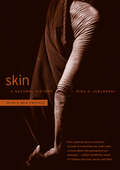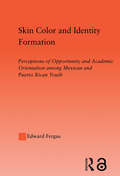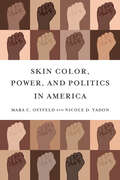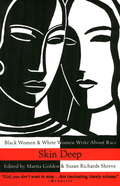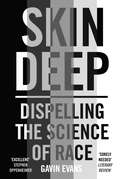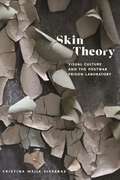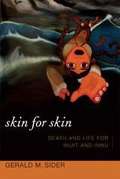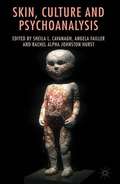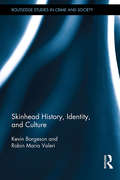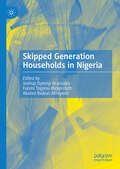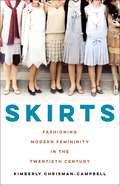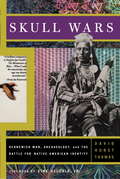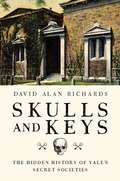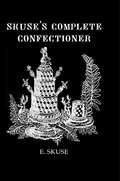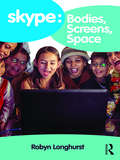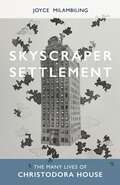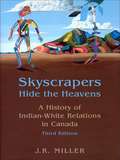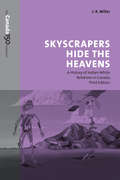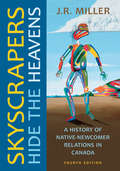- Table View
- List View
Skin
by Nina G. JablonskiWe expose it, cover it, paint it, tattoo it, scar it, and pierce it. Our intimate connection with the world, skin protects us while advertising our health, our identity, and our individuality. This dazzling synthetic overview is a complete guidebook to the pliable covering that makes us who we are. Skin: A Natural History celebrates the evolution of three unique attributes of human skin: its naked sweatiness, its distinctive sepia rainbow of colors, and its remarkable range of decorations. Jablonski places the rich cultural canvas of skin within its broader biological context for the first time, and the result is a tremendously engaging look at us.
Skin Acts: Race, Psychoanalysis, and the Black Male Performer
by Michelle Ann StephensIn Skin Acts, Michelle Ann Stephens explores the work of four iconic twentieth-century black male performers--Bert Williams, Paul Robeson, Harry Belafonte, and Bob Marley--to reveal how racial and sexual difference is both marked by and experienced in the skin. She situates each figure within his cultural moment, examining his performance in the context of contemporary race relations and visual regimes. Drawing on Lacanian psychoanalysis and performance theory, Stephens contends that while black skin is subject to what Frantz Fanon called the epidermalizing and hardening effects of the gaze, it is in the flesh that other--intersubjective, pre-discursive, and sensuous--forms of knowing take place between artist and audience. Analyzing a wide range of visual, musical, and textual sources, Stephens shows that black subjectivity and performativity are structured by the tension between skin and flesh, sight and touch, difference and sameness.
Skin Bleaching in Black Atlantic Zones: Shade Shifters
by S. TateThis book's discussion of skin bleaching, lightening and toning in Black Atlantic zones disengages with the usual tropes of Black Nationalism and global white supremacy such as 'the desire to be white', 'low self-esteem' and 'self-hatred' and instead engages with the global multi-billion dollar market in lighter skins with products from local cosmetic and pharmaceutical companies and entrepreneurs. This practice can be for short-term strategic purposes and the production of bleached lightness and new subjectivities through skin shades across Black Atlantic zones - the UK, USA, Caribbean, Latin America and the Africa continent- is also a simultaneous critique of continuing pigmentocracy and darker skin disadvantage. This book seeks to decolonize skin bleaching, lightening and toning by exploring its racialized gender political and libidinal economies in the Black Atlantic. In so doing it moves past the notion that global white supremacy dynamizes the practice to a position where the interaction of colourism and 'post-race' neo-liberal racialization aesthetics becomes the focus.
Skin Bleaching in Black Atlantic Zones: Shade Shifters
by Shirley Anne TateSkin Bleaching in Black Atlantic Zones.
Skin City: Behind the Scenes of the Las Vegas Sex Industry
by Jack SheehanPart exposé, part x-rated travel guide -- the ultimate insider's look at America's adult playgroundVegas. It's a place where Midwestern couples become uninhibited swingers, where shy schoolgirls morph into sexy strippers pulling in $1,000 a night, and where randy tourists come to score at more than just blackjack and craps. What happens here, stays here -- and Vegas nightlife is hotter than it's ever been before.In Skin City, journalist and longtime Vegas resident Jack Sheehan goes beyond the bright lights to explore the dark thrills of the city's sex industry. Both lurid and fascinating, here is an unabashed look at the stripping, swinging, hustling, and hooking that have turned a desert gaming metropolis into the world's capital of lascivious entertainment. But more than a no-holds-barred exposé, Sheehan's Skin City offers a connoisseur's catalogue of where to go for readers whose tastes run to the erotic -- with everything from valuable pointers from lap dancers, call girls, and vice cops to porn star Jenna Jameson's list of her favorite Vegas strip clubs.
Skin Color and Identity Formation: Perception of Opportunity and Academic Orientation Among Mexican and Puerto Rican Youth (Latino Communities: Emerging Voices - Political, Social, Cultural and Legal Issues)
by Edward FergusThe focus of this study is on the ways in which skin color moderates the perceptions of opportunity and academic orientation of 17 Mexican and Puerto Rican high school students. More specifically, the study's analysis centered on cataloguing the racial/ethnic identification shifts (or not) in relation to how they perceive others situate them based on skin color.
Skin Color, Power, and Politics in America
by Mara Cecilia Ostfeld Nicole YadonA person’s skin color affects their life experiences including income, educational attainment, health outcomes, exposure to discrimination, interactions with the criminal justice system and one’s sense of ethnoracial group belonging. But, do these disparate experiences affect the relationship between skin color and political views? In Skin Color, Power, and Politics in America, political scientists Mara Ostfeld and Nicole Yadon explore the relationship between skin color and political views in the U.S. among Latino, Black, and White Americans. They examine how skin color influences an individual’s politics and whether a person’s political views influence how they assess their own skin color. Ostfeld and Yadon surveyed over 1,300 people about their political views, including party affiliation, their opinions on welfare, and the importance of speaking English in the U.S. The authors created a matrix grounded in their “Roots of Race” framework, which predicts the relationship between skin color and political attitudes for each ethnoracial group based on the blurriness of the group’s boundaries and historical levels of privilege. They draw upon three distinct measures of skin color to conceptualize the relationship between skin color and political views: “Machine-Rated Skin Color,” measured with a light-reflectance meter; “Self-Assessed Skin Color,” using the Yadon-Ostfeld Skin Color Scale; and “Skin Color Discrepancy,” the difference between one’s Machine-Rated and Self-Assessed Skin Color. Ostfeld and Yadon examine patterns that emerge among these measures, and their relationships with life experiences and political stances. Among Latinos, a group with relatively blurry group boundaries and low levels of historical privilege, the authors find a robust relationship between political views and Self-Assessed Skin Color. Latinos who overestimate the lightness of their skin color are more likely to hold conservative views on current racialized political issues, such as policing. Latinos who overestimate the darkness of their skin color, on the other hand, are more likely to hold liberal political views. As America’s major political parties remain divided on issues of race, this suggests that for Latinos, self-reported skin color is used as a means of aligning oneself with valued political coalitions. African Americans, another group with low levels of historical privilege but with more clearly defined group boundaries, demonstrated no significant relationship between skin color and political attitudes. Thus, the lived experiences associated with being African American appeared to supersede the differences in life experiences due to skin color. Whites, a group with more historical privilege and increasingly blurry group boundaries, showed a clear relationship between machine-assessed skin color and attitudes on political issues. Those with darker Machine-Rated Skin Color are more likely to hold conservative views, suggesting that they are responding to the threat of losing their privilege in a multicultural society. At a time when the U.S. is both more diverse and politically divided, Skin Color, Power, and Politics in Americais a timely account of the ways in which skin color and politics are intertwined.
Skin Deep
by Susan Shreve Marita GoldenCandid, poignant, provocative, and informative, the essays and stories in Skin Deep explore a wide spectrum of racial issues between black and white women, from self-identity and competition to childrearing and friendship. Eudora Welty contributes a bittersweet story of a one-hundred-year-old black woman whose spirit is as determined and strong as anything in nature. Bestselling author Naomi Wolf recalls her first exposure to racism growing up, examining the subtle forms it can take even among well-meaning people; bell hooks writes about the intersection between black women and feminist politics; and Joyce Carol Oates includes a one-act play in which racial stereotypes are reversed. Among the other writers featured in the collection are Toni Morrison, Alice Walker, Susan Straight, Mary Morris, and Beverly Lowry. A groundbreaking anthology that reveals surprising insights and hidden truths to a subject too often clouded by misperceptions and easy assumptions, Skin Deep is a major contribution to understanding our culture.From the Trade Paperback edition.
Skin Deep: Journeys in the Divisive Science of Race
by Gavin EvansEverything you need to know about race (but were afraid to ask). MYTH: Early Europeans were white. REALITY: The first Europeans had dark skin, black, curly hair and blue eyes. MYTH: Between 50,000 and 70,000 years ago, a &‘cognitive revolution&’ led to the birth of culture in Europe. REALITY: Modern intelligence evolved tens of thousands of years earlier, leading to the birth of culture in Africa.Does racism have a rational basis in science? In Skin Deep, Gavin Evans tackles head-on the debate that has been raging on internet message boards and in academic journals. No longer limited to the fringe, race-based studies of intelligence have been discussed by thinkers such as Sam Harris and Jordan Peterson. If these studies were true, they would provide an intellectual justification for inequality and discrimination. Examining the latest research on how intelligence develops and laying out new discoveries in genetics, palaeontology, archaeology and anthropology to unearth the truth about our shared past, Skin Deep demolishes the pernicious myth that our race is our destiny and instead reveals what really makes us who we are.
Skin Theory: Visual Culture and the Postwar Prison Laboratory
by Cristina Mejia VisperasHonorable Mention, Rachel Carson Prize, given by the Society for the Social Studies of ScienceFinalist, 2023 ASAP Book Award, given by the Association for the Study of the Arts of the PresentStudies the intersections of incarceration, medical science, and race in postwar AmericaIn February 1966, a local newspaper described the medical science program at Holmesburg Prison, Philadelphia, a “golden opportunity to conduct widespread medical tests under perfect control conditions.” Helmed by Albert M. Kligman, a University of Pennsylvania professor, these tests enrolled hundreds of the prison’s predominantly Black population in studies determining the efficacy and safety of a wide variety of substances, from common household products to chemical warfare agents. These experiments at Holmesburg were hardly unique; in the postwar United States, the use of incarcerated test subjects was standard practice among many research institutions and pharmaceutical companies. Skin Theory examines the prison as this space for scientific knowledge production, showing how the “perfect control conditions” of the prison dovetailed into the visual regimes of laboratory work. To that end, Skin Theory offers an important reframing of visual approaches to race in histories of science, medicine, and technology, shifting from issues of scientific racism to the scientific rationality of racism itself. In this highly original work, Cristina Mejia Visperas approaches science as a fundamentally racial project by analyzing the privileged object and instrument of Kligman’s experiments: the skin. She theorizes the skin as visual technology, as built environment, and as official discourse, developing a compelling framework for understanding the intersections of race, incarceration, and medical science in postwar America.
Skin for Skin: Death and Life for Inuit and Innu
by Gerald M. SiderSince the 1960s, the Native peoples of northeastern Canada, both Inuit and Innu, have experienced epidemics of substance abuse, domestic violence, and youth suicide. Seeking to understand these transformations in the capacities of Native communities to resist cultural, economic, and political domination, Gerald M. Sider offers an ethnographic analysis of aboriginal Canadians' changing experiences of historical violence. He relates acts of communal self-destruction to colonial and postcolonial policies and practices, as well as to the end of the fur and sealskin trades. Autonomy and dignity within Native communities have eroded as individuals have been deprived of their livelihoods and treated by the state and corporations as if they were disposable. Yet Native peoples' possession of valuable resources provides them with some income and power to negotiate with state and business interests. Sider's assessment of the health of Native communities in the Canadian province of Labrador is filled with potentially useful findings for Native peoples there and elsewhere. While harrowing, his account also suggests hope, which he finds in the expressiveness and power of Native peoples to struggle for a better tomorrow within and against domination.
Skin, Culture and Psychoanalysis
by Sheila L. Cavanagh Angela Failler Rachel Alpha Johnston HurstAn interdisciplinary study of skin bridging cultural and psychoanalytic theory to consider how the body's "exterior" is central to human subjectivity and relations. The authors explore racialization, body modification, self-harm, and comedic representations of skin, drawing from the clinical domain, visual arts, popular culture, and literature.
Skinhead History, Identity, and Culture (Routledge Studies in Crime and Society)
by Kevin Borgeson Robin ValeriSkinheads go beyond the societal stereotype of hate mongers, bigots, and Neo-Nazis. The community of skins also includes traditional skins (those that adhere to the original philosophy of the British movement in 1969), Skinheads Against Racial prejudice (SHARPS), and gay skins, female skins and Neo-Nazi or Racist/Nationalist skins. Skinhead History, Identity, and Culture covers the history, identity, and culture of the skinhead movement in Europe and America, looking at the total culture of the skins through a cross-sectional analysis of skinheads in various countries. Authors Borgeson and Valeri provide original research data to cast new light into the skinhead community. Some of the data is ethnographic, drawing on face-to-face interviews with skins of all kinds, while other data is compiled from the Internet and social media about various skinhead groups within the United States, Europe, and Australia. The book covers the history of the subculture; explores the unique cultures of female, gay, and Neo-Nazi skins; and explores manifestations of the culture as represented on the Internet and in music. The work discusses how skinheads derive their values and morals and how they fit into the larger social structure.
Skipped Generation Households in Nigeria
by Joshua Oyeniyi Aransiola Funmi Togonu-Bickersteth Akanni Ibukun AkinyemiThis volume unpacks the phenomenon of skipped generation households—where children live with their grandparents and without their parents—as they become an increasingly common family dynamic in Nigeria and globally. The skipped generation household's emergence in sub-Saharan Africa has been driven by factors including the HIV/AIDS epidemic, labour-based migration, and ethno-religious conflicts. By examining the data from a national study on skipped generation households in Nigeria, contributions track benefits, opportunities, and effects associated with growing up in these households. Details including academic performance and career aspirations for grandchildren, as well as social-psychological and physical well-being of both them and their grandparents, are explored.
Skirts: Fashioning Modern Femininity in the Twentieth Century
by Kimberly Chrisman-CampbellIn a sparkling, beautifully illustrated social history, Skirts traces the shifting roles of women over the twentieth century through the era’s most iconic and influential dresses.While the story of women’s liberation has often been framed by the growing acceptance of pants over the twentieth century, the most important and influential female fashions of the era featured skirts. Suffragists and soldiers marched in skirts; the heroines of the Civil Rights Movement took a stand in skirts. Frida Kahlo and Georgia O’Keeffe revolutionized modern art and Marie Curie won two Nobel Prizes in skirts. When NASA put a man on the moon, “the computer wore a skirt,” in the words of one of those computers, mathematician Katherine G. Johnson. As women made strides towards equality in the vote, the workforce, and the world at large, their wardrobes evolved with them. They did not need to "wear the pants" to be powerful or progressive; the dress itself became modern as designers like Mariano Fortuny, Coco Chanel, Jean Patou, and Diane von Furstenberg redefined femininity for a new era. Kimberly Chrisman-Campbell's Skirts looks at the history of twentieth-century womenswear through the lens of game-changing styles like the little black dress and the Bar Suit, as well as more obscure innovations like the Taxi dress or the Pop-Over dress, which came with a matching potholder. These influential garments illuminate the times in which they were first worn—and the women who wore them—while continuing to shape contemporary fashion and even opening the door for a genderfluid future of skirts. At once an authoritative work of history and a delightfully entertaining romp through decades of fashion, Skirts charts the changing fortunes, freedoms, and aspirations of women themselves.
Skull Wars Kennewick Man, Archaeology, And The Battle For Native American Identity: Kennewick Man, Archaeology, And The Battle For Native American Identity
by David H. ThomasThe 1996 discovery, near Kennewick, Washington, of a 9,000-year-old Caucasoid skeleton brought more to the surface than bones. The explosive controversy and resulting lawsuit also raised a far more fundamental question: Who owns history? Many Indians see archeologists as desecrators of tribal rites and traditions; archeologists see their livelihoods and science threatened by the 1990 Federal reparation law, which gives tribes control over remains in their traditional territories. In this new work, Thomas charts the riveting story of this lawsuit, the archeologists’ deteriorating relations with American Indians, and the rise of scientific archeology. His telling of the tale gains extra credence from his own reputation as a leader in building cooperation between the two sides.
Skulls and Keys: The Hidden History of Yale's Secret Societies
by David Alan RichardsThe mysterious, highly influential hidden world of Yale’s secret societies is revealed in a definitive and scholarly history. Secret societies have fundamentally shaped America’s cultural and political landscapes. In ways that are expected but never explicit, the bonds made through the most elite of secret societies have won members Pulitzer Prizes, governorships, and even presidencies. At the apex of these institutions stands Yale University and its rumored twenty-six secret societies. Tracing a history that has intrigued and enthralled for centuries, alluring the attention of such luminaries as Ernest Hemingway, William Faulkner and F. Scott Fitzgerald, Skulls and Keys traces the history of Yale’s societies as they set the foundation for America’s future secret clubs and helped define the modern age of politics. But there is a progressive side to Yale’s secret societies that we rarely hear about, one that, in the cultural tumult of the nineteen-sixties, resulted in the election of people of color, women, and gay men, even in proportions beyond their percentages in the class. It’s a side that is often overlooked in favor of sensational legends of blood oaths and toe-curling conspiracies. Dave Richards, an alum of Yale, sheds some light on the lesser known stories of Yale’s secret societies. He takes us through the history from Phi Beta Kappa in the American Revolution (originally a social and drinking society) through Skull and Bones and its rivals in the nineteenth and twentieth centuries. While there have been articles and books on some of those societies, there has never been a scholarly history of the system as a whole.
Skuse'S Complete Confectioner
by SkuseFirst published in 2005. Routledge is an imprint of Taylor & Francis, an informa company.
Skydive
by Kevin KerrHaving grown apart after a traumatic and defining moment in their youth, two brothers reconnect to fulfill a life-long ambition to go skydiving. Skydive explores the world of dreams and imagination: the universal human desire to push beyond our physical limitations and to fly.
Skye: The Island and Its Legends (Landscapes In Stone Ser.)
by Otta SwireAn oral history by &“Scotland&’s forgotten folklorist&” whose tale inspired the Neil Gaiman novella The Truth Is a Cave in the Black Mountains (The Spooky Isles). This is a fabulous treasury of legend and wonder—tales of monsters who dwell in lakes; of small people who trap humans in earthen mounds where time stands still; of dark, shapeshifting spirits whose cloak of human form is betrayed by the sand and shells which fall from their hair. In the absence of a written tradition, for generations of skianachs, these tales, handed down orally, contained the very warp and weft of Hebridean history. They take us far beyond Christian times, to the edge of the Iron Age, and interweave with threads from the wider Atlantic tradition of Gaelic heroic myth and legend. Absolute Escapes—which lists Skye as one of the &“8 Books You Should Read Before Visiting Scotland&”—raves, &“This fascinating book written in the 1950s still has relevance today as it maps a route around the island, mixing mythology and local history to capture the spirit of the land and its legends. This is a great guide to the Isle of Skye, and a jolt to the imagination.&” &“Swire&’s prose makes for a very entertaining read . . . as a source of folklore, it&’s unbeatable.&” —The Spooky Isles
Skype: Bodies, Screens, Space,
by Robyn LonghurstDespite the popularity of Skype with video many of us are still figuring out how to ‘do’ it. Interviews reveal that we can now run the programme but we are less certain about how to ‘perform’ in front of the webcam. Seeing ourselves in the box on the side can feel strange. We are not quite sure which bits of our bodies to display on the screen, how much to move around the room, or move the device around the room. Is it acceptable to use Skype with video at a funeral, in crowded spaces or while in bed? This book addresses how people are emotionally and affectually connecting with others audio-synchronously on the screen in a variety of different spatial contexts. Topics include Skype with video being used by grandparents to connect with grandchildren, friends and family using it for special occasions, and partners using it for romance and sex. Theories addressing bodies, gender, queerness, phenomenology and orientation inform the research. It concludes that while Skype does not offer some kind of utopian future, it does open up possibilities for existing power relations to be filtered through new lines of sight/site which are shaping what bodies can do and where.
Skyscraper Settlement: The Many Lives of Christodora House
by Joyce MilambilingThe roles that Christodora House has played from 19th-century settlement house to its newest formsSettlement house workers helped transform the lives of thousands of people despite lack of funding, the influenza epidemic of 1918, economic depressions, and two World Wars. Many of these houses still exist in the original neighborhoods where they confront the problems of today and advocate for their communities.Christodora House, founded in 1897 as “The Young Women’s Settlement,” played an important role in the life of immigrants and other residents on the Lower East Side of Manhattan. For over 50 years, residents and volunteers at Christodora House provided classes, clubs, recreational activities, and medical and dental clinics for thousands of New Yorkers, and then continued to operate programs out of public housing and other locations for more than two decades.The building at 143 Avenue B, now housing condominiums, has had a tumultuous history since 1948 but still stands, towering over its tenement neighborhood in the East Village. Christodora Inc. is now a nonprofit foundation with offices in Midtown Manhattan, whose staff works with underserved New Yorkers, including youth in the public school system, carrying on a long, distinguished history of service to the city and country.
Skyscrapers Hide the Heavens
by J. R. MillerHighly acclaimed when the first edition appeared in 1989, "Skyscrapers Hide the Heavens" is the first comprehensive account of Indian-white relations throughout Canada's history. J.R. Miller charts the deterioration of the relationship from the initial, mutually beneficial contact in the fur trade to the current impasse in which Indians are resisting displacement and marginalization.This new edition is the result of substantial revision to incorporate current scholarship and bring the text up to date. It includes new material on the North, and reflects changes brought about by the Oka crisis, the sovereignty issue, and the various court decisions of the 1990s. It also includes new material on residential schools, treaty making, and land claims.
Skyscrapers Hide the Heavens: A History of Indian-White Relations in Canada
by J. R. MillerHighly acclaimed when the first edition appeared in 1989, "Skyscrapers Hide the Heavens" is the first comprehensive account of Indian-white relations throughout Canada's history. J.R. Miller charts the deterioration of the relationship from the initial, mutually beneficial contact in the fur trade to the current impasse in which Indians are resisting displacement and marginalization.This new edition is the result of substantial revision to incorporate current scholarship and bring the text up to date. It includes new material on the North, and reflects changes brought about by the Oka crisis, the sovereignty issue, and the various court decisions of the 1990s. It also includes new material on residential schools, treaty making, and land claims.
Skyscrapers Hide the Heavens: A History of Native-Newcomer Relations in Canada, Fourth Edition
by J. R. MillerFirst published in 1989, Skyscrapers Hide the Heavens continues to earn wide acclaim for its comprehensive account of Native-newcomer relations throughout Canada’s history. Author J.R. Miller charts the deterioration of the relationship from the initial, mutually beneficial contact in the fur trade to the current displacement and marginalization of the Indigenous population. The fourth edition of Skyscrapers Hide the Heavens is the result of considerable revision and expansion to incorporate current scholarship and developments over the past twenty years in federal government policy and Aboriginal political organization. It includes new information regarding political organization, land claims in the courts, public debates, as well as the haunting legacy of residential schools in Canada. Critical to Canadian university-level classes in history, Indigenous studies, sociology, education, and law, the fourth edition of Skyscrapers will be also be useful to journalists and lawyers, as well as leaders of organizations dealing with Indigenous issues. Not solely a text for specialists in post-secondary institutions, Skyscrapers Hide the Heavens explores the consequence of altered Native-newcomer relations, from cooperation to coercion, and the lasting legacy of this impasse.
